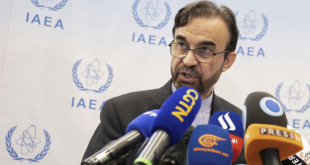 TEHRAN (Fars News Agency)- Iranian Foreign Ministry Spokesman Seyed Mohammad Ali Hosseini criticized western countries for their negative approach towards Iran’s nuclear issue, stressing that UN Security Council Resolution 1737 on Iran undermines Non-Proliferation Treaty (NPT).
TEHRAN (Fars News Agency)- Iranian Foreign Ministry Spokesman Seyed Mohammad Ali Hosseini criticized western countries for their negative approach towards Iran’s nuclear issue, stressing that UN Security Council Resolution 1737 on Iran undermines Non-Proliferation Treaty (NPT).
Speaking to reporters during his weekly press conference here on Sunday, Hosseini rejected earlier reports about the installation and launch of operation of 3000 centrifuges by Iran, but meantime, refrained from providing any further details in this regard.
He said Iran’s Atomic Energy Organization is in charge of the issue as it is a technical topic.
The spokesman also declined to provide any information about the controversial ‘good news’ to be revealed by President Ahmadinejad during the Ten-Day Dawn period (11 – 21 of February).
The Ten-Day Dawn marks the anniversary of the victory of the Islamic Revolution in Iran in 1979, when Iranians embraced final victory in dethroning the last king of Pahlavi dynasty.
Asked about a recent letter forwarded to the 14 members of the UN Security Council by Iranian Foreign Minister Manouchehr Mottaki, he said that the message reminded the right of all NPT member states to enjoy advantages of nuclear energy and that UNSC members should not embark on adopting illegal or politically motivated decisions in this regard since such a measure undermines the NPT.
Hosseini said that the letter also included a historical background of Iran’s nuclear plans reminding that all Iran’s activities have been monitored by the inspectors of the International Atomic Energy Agency (IAEA) and that not even a single word in the reports and statements of IAEA inspectors and Director General Mohammed ElBaradei has ever pointed to the diversion of Iran’s activities from peaceful to a military nature.
“And that suffices for anyone to make sure that Iran’s nuclear plans are totally civilian and peaceful in nature,” he continued.
The diplomat added that Mottaki’s letter also reminded UNSC members of Iran’s ample confidence building measures and voiced Iran’s continued preparedness to resume talks.
Meantime, he mentioned that any such talks should be void of any kind of prerequisite, reiterating that threats and pressures may not deter Iranian officials and statesmen from pursuing the country’s inalienable rights stipulated in the NPT.
“The letter advises UNSC member states to give up their present path and return to the negotiating table and not to turn a simple issue into a complicated crisis otherwise this would be the entire international community which has to sustain the damages,” the Iranian foreign ministry spokesman said.
Asked about a reported letter from IAEA to Iran demanding Tehran to revise its decision about barring 38 inspectors from visiting Iranian nuclear sites, Hosseini said that no such message has been received by the Iranian officials.
Asked if Iran would accept to suspend its nuclear enrichment under any specific condition, he stressed that Tehran is decisive to continue with its uranium enrichment activities, but meantime reminded, “We welcome any comprehensive plan complying with the Non-Proliferation Treaty (NPT) which guarantees Iran’s rights.”
The diplomat also underlined that Iran would continue its cooperation with the International Atomic Energy Agency (IAEA), mentioning that Iran-IAEA cooperation has not been ceased.
Elsewhere, Hosseini said some US politicians and statesmen have sent several messages to the Islamic Republic. He said that Iranian officials are now studying the letters and will soon announce the results of their contemplation in this regard.
He declined to comment on the contents of the messages or identity of the writers.
Asked about the current visit to Tehran by Russian Security Council Secretary Igor Ivanov, the spokesman said that the trip is aimed at discussing bilateral ties and exchanging views about regional and international issues.
He also said that the visit falls within the routine consultations and exchanges of views between senior Iranian and Russian officials.
Elsewhere, Hosseini dismissed recent statements by some US officials, including US Ambassador to Iraq Zalmay Khalilzad, about the Iranian diplomats who have been kidnapped by the US troops in Iraq, saying that such remarks are unfounded and completely baseless.
Khalilzad had earlier claimed that the US would soon disclose a series of documents and plans confiscated from the arrested Iranians in Iraq, which he said substantiate Iran’s intervention in Iraq.
By ‘arrested Iranians’ he meant five Islamic Republic diplomats who were kidnapped during a raid by the US troops on Iran’s consulate general in the northern Iraqi city of Erbil at around 3 a.m. on January 11.
During the raid, US troops disarmed the guards outside the Iranian consulate in Erbil, broke into the building and confiscated computers and documents there while military helicopters were hovering overhead.
Despite Americans’ allegations, the liaison office had diplomatic immunity and functioned as a consulate general issuing travel documents and carrying out other consular tasks. An Iranian flag flying over the building was hauled down during the raid.
The foreign ministry spokesman also said that his ministry has appointed new consul generals for its diplomatic offices in the Iraqi cities of Erbil and Soleymanieh.
Also commenting on recent reports about the establishment of a Synagogue under the al-Aqsa Mosque in the occupied Palestine, he underscored that construction of a synagogue or brining any alterations to the religious, historical and ancient sites and buildings of Muslims, specially the al-Aqsa Mosque, is a danger posed to the entire world of Islam.
 Eurasia Press & News
Eurasia Press & News


